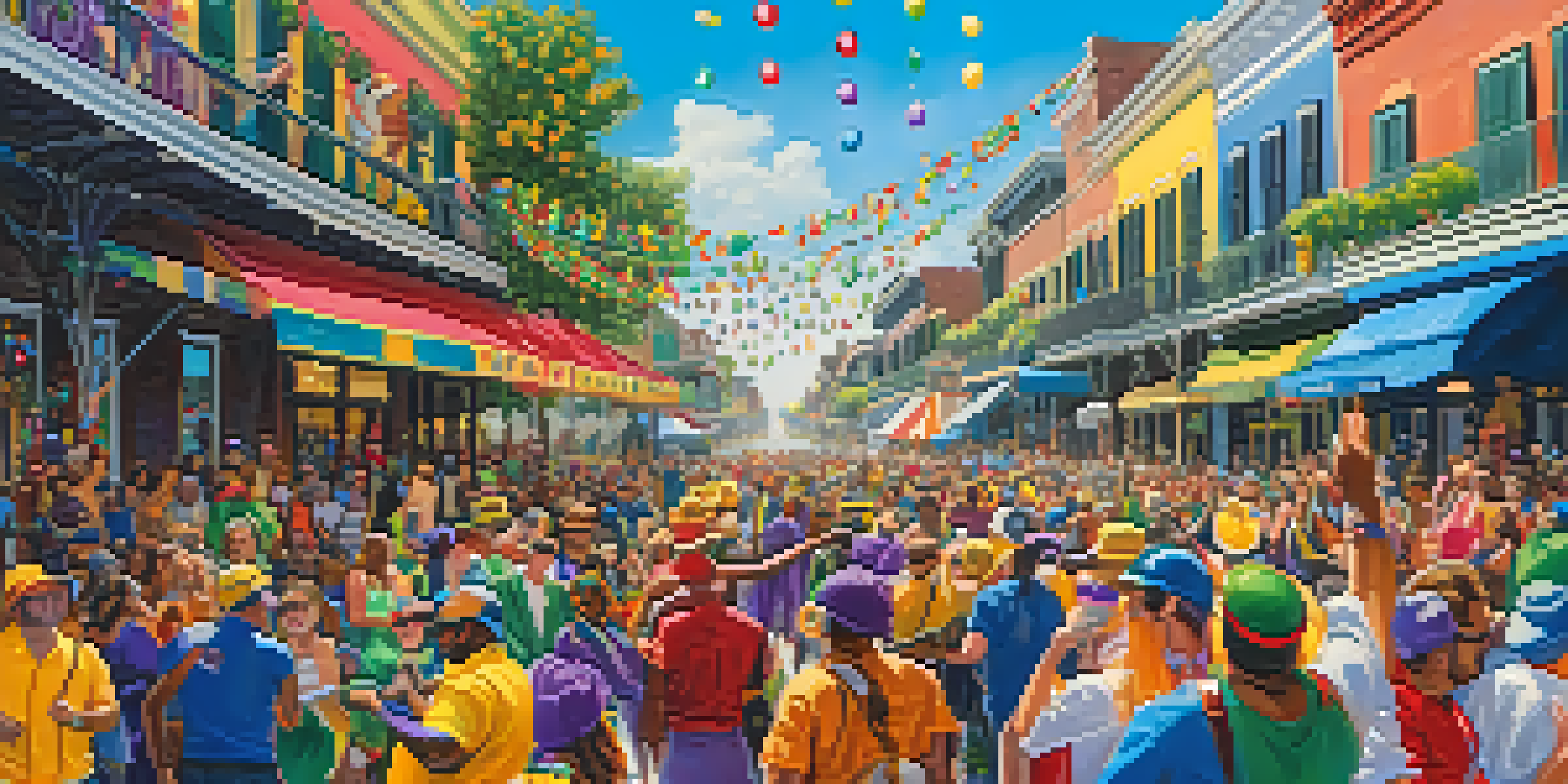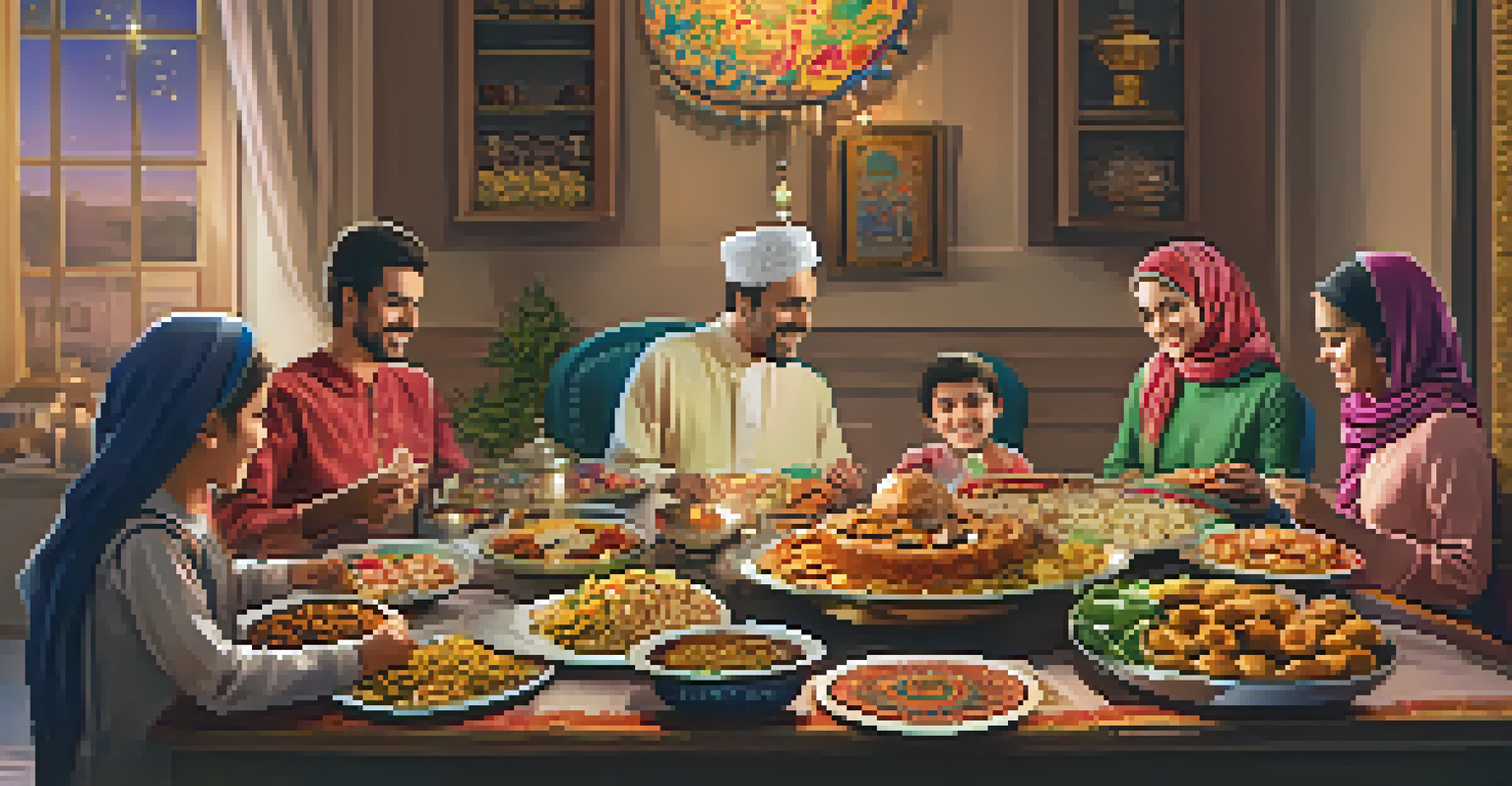Festivals of Faith: Religious Celebrations Across America

The Rich Tapestry of American Religious Festivals
America is a melting pot of cultures and religions, making its festivals incredibly diverse. Each celebration reflects the beliefs and traditions of various faiths, creating a rich tapestry of experiences. From the colorful parades of Mardi Gras to the solemn observances of Yom Kippur, these events offer a glimpse into the heart of American spirituality.
Celebration is a way of bringing people together, uniting them in a shared experience of joy and gratitude.
Many festivals serve as a bridge between generations, allowing families to share their heritage with younger members. For instance, Diwali, the Hindu festival of lights, not only celebrates the triumph of light over darkness but also strengthens familial bonds through shared traditions. This intergenerational exchange fosters a sense of belonging and identity within communities.
Moreover, these festivals often create a sense of unity among people from different backgrounds. When communities come together to celebrate events like Eid al-Fitr or Christmas, it highlights shared values and fosters understanding. In this way, religious festivals contribute to a more inclusive society, celebrating both diversity and common humanity.
The Joy of Mardi Gras: A Celebration of Community
Mardi Gras, celebrated primarily in New Orleans, is a vibrant festival that showcases the city's unique cultural heritage. It combines elements of Catholic tradition with African, Caribbean, and French influences, creating a festive atmosphere filled with parades, music, and colorful costumes. The joyful spirit of Mardi Gras embodies the idea of community coming together to celebrate life.

During this time, locals and visitors indulge in traditional foods like king cake and gumbo, which further enhances the sense of togetherness. The festival's lively parades bring people of all ages together, encouraging them to dance, sing, and revel in the festive spirit. This joyous celebration is not just about the fun; it also serves as a time for reflection before the solemnity of Lent.
Diversity in American Festivals
Religious festivals in America showcase a rich tapestry of cultures, reflecting various beliefs and traditions.
Mardi Gras exemplifies how religious celebrations can evolve to include cultural elements, making them accessible to everyone. While rooted in religious observance, it has transformed into a broader celebration of life, creativity, and community. This blending of traditions highlights the dynamic nature of faith-based festivals in America.
Eid al-Fitr: A Festival of Gratitude and Togetherness
Eid al-Fitr marks the end of Ramadan, a month of fasting and reflection for Muslims around the world. This joyous festival is celebrated with family gatherings, feasting, and giving to those in need, emphasizing the importance of community and gratitude. It’s a time when Muslims express their appreciation for the blessings in their lives.
Diversity is not a reason to be divided; it is a reason to come together and celebrate our differences.
During Eid, the atmosphere is filled with joy as families come together to share meals and exchange gifts. The act of giving, known as Zakat al-Fitr, ensures that even those less fortunate can partake in the celebrations, reinforcing the value of compassion and unity within the community. This sense of togetherness is a cornerstone of the festival.
Celebrating Eid al-Fitr in America often includes a blend of traditional practices and local customs, reflecting the diverse backgrounds of Muslim communities. Events might feature cultural performances, communal prayers at mosques, and neighborhood gatherings that invite everyone to join in the festivities. This open invitation fosters understanding and appreciation between different cultures.
Hanukkah: The Festival of Lights and Resilience
Hanukkah, also known as the Festival of Lights, is a Jewish celebration that commemorates the rededication of the Second Temple in Jerusalem. Spanning eight nights, it involves lighting the menorah, playing dreidel, and enjoying delicious foods like latkes. This festival is a beautiful reminder of faith, resilience, and the triumph of light over darkness.
For many Jewish families, Hanukkah is an opportunity to come together and share stories of their heritage. It’s a time for reflection on the struggles faced by their ancestors and the importance of preserving their culture. This blend of tradition and storytelling strengthens familial bonds and instills a sense of pride in their identity.
Community Through Celebration
These celebrations foster unity and understanding among diverse groups, strengthening community bonds and shared values.
In America, Hanukkah celebrations have also evolved, inviting friends and neighbors from different backgrounds to partake in the festivities. Community gatherings often feature music, dance, and delicious food, creating an inclusive atmosphere. This openness not only enriches the experience but also fosters interfaith dialogue and understanding.
Diwali: The Festival of Lights Across Cultures
Diwali, the Hindu festival of lights, is a celebration that symbolizes the victory of light over darkness and good over evil. In America, this vibrant festival has transcended cultural boundaries, attracting individuals from various backgrounds to partake in its festivities. The lighting of diyas (oil lamps) and the bursting of fireworks create a magical atmosphere filled with joy and hope.
Families celebrate by decorating their homes, preparing traditional sweets, and exchanging gifts, fostering a sense of community and togetherness. Diwali is not just about individual celebrations; it’s an opportunity for families and friends to come together, share meals, and strengthen their bonds. This communal aspect is integral to the festival's spirit.
Moreover, Diwali celebrations in America often include cultural performances, dance, and music, showcasing the rich heritage of Indian culture. These events invite people from all walks of life to experience the beauty of this festival, promoting inclusivity and understanding. Such celebrations highlight the shared values of joy, light, and unity across different cultures.
Christmas: A Time for Giving and Gathering
Christmas, celebrated by millions across the globe, is a time of joy, giving, and gathering with loved ones. In America, this holiday has evolved into a celebration that transcends its religious roots, embracing people of all backgrounds. The festive spirit is palpable in the air, with decorations, music, and communal events bringing communities together.
Traditions such as exchanging gifts, decorating Christmas trees, and attending church services create a sense of warmth and unity. Many families engage in acts of kindness during this season, whether through volunteering or donating to those in need. This focus on giving reinforces the festival's core message of love and compassion.
Cultural Exchange and Inclusivity
Religious festivals invite participation from all backgrounds, promoting inclusivity and appreciation for different cultures.
Moreover, Christmas celebrations in America often include a mix of cultural influences, from traditional caroling to modern holiday events. Communities come alive with festivals, parades, and light displays, inviting everyone to join in the festivities. This openness not only promotes inclusivity but also fosters a sense of shared joy and togetherness during the holiday season.
Kwanzaa: Honoring African Heritage and Community
Kwanzaa is a week-long celebration that honors African heritage and culture, observed annually from December 26 to January 1. Founded in 1966, it promotes values such as unity, self-determination, and collective work and responsibility. The festival is a time for reflection, community gatherings, and the celebration of cultural heritage.
Each of the seven days of Kwanzaa is dedicated to a specific principle, encouraging participants to engage in discussions and activities that foster community bonds. Families come together to light the kinara (a candle holder) and share stories, creating a rich tapestry of shared experiences and wisdom. This focus on community and culture is central to the celebration.

In America, Kwanzaa has gained recognition as a way to celebrate African American heritage and create a sense of belonging. Events often include cultural performances, workshops, and communal meals, inviting everyone to partake in the festivities. This inclusivity not only enriches the experience but also fosters intergenerational dialogue and understanding.
The Importance of Religious Celebrations in America
Religious celebrations play a vital role in American society, providing opportunities for personal reflection and communal bonding. They allow individuals to connect with their faith and heritage while also promoting understanding among diverse groups. These festivals serve as a reminder of the shared values that unite us, despite our differences.
Moreover, by participating in various religious celebrations, we gain insights into the rich cultural tapestry of our nation. This exposure fosters empathy and appreciation for different beliefs and traditions, creating a more harmonious society. Celebrations like Holi, Easter, and Thanksgiving highlight the importance of community, love, and gratitude.
Ultimately, festivals of faith in America remind us of our shared humanity and the beauty of diversity. They encourage us to celebrate not only our own traditions but also those of our neighbors, creating a more inclusive and compassionate world. As we embrace these celebrations, we cultivate a deeper understanding of one another, fostering a spirit of unity and respect.